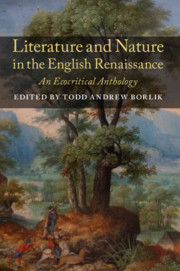Book contents
- Frontmatter
- Contents
- List of Illustrations
- Acknowledgements
- Editorial Principles: Towards the Ecocritical Editing of Renaissance Texts
- Introduction
- PART I Cosmologies
- PART II The Tangled Chain
- Hierarchy and the Human Animal
- Beasts
- Birds
- Fish
- Insects
- Plants
- Gems, Metals, Elements, Atoms
- PART III Time and Place
- PART IV Interactions
- PART V Environmental Problems in Early Modern England
- PART VI Disaster and Resilience in the Little Ice Age
- Appendix A Industrialization and Environmental Legislation in the Early Anthropocene: A Timeline
- Appendix B Further Reading: A Bibliography of Environmental Scholarship on the English Renaissance
Fish
from PART II - The Tangled Chain
Published online by Cambridge University Press: 05 June 2019
- Frontmatter
- Contents
- List of Illustrations
- Acknowledgements
- Editorial Principles: Towards the Ecocritical Editing of Renaissance Texts
- Introduction
- PART I Cosmologies
- PART II The Tangled Chain
- Hierarchy and the Human Animal
- Beasts
- Birds
- Fish
- Insects
- Plants
- Gems, Metals, Elements, Atoms
- PART III Time and Place
- PART IV Interactions
- PART V Environmental Problems in Early Modern England
- PART VI Disaster and Resilience in the Little Ice Age
- Appendix A Industrialization and Environmental Legislation in the Early Anthropocene: A Timeline
- Appendix B Further Reading: A Bibliography of Environmental Scholarship on the English Renaissance
Summary
When a 1617 pamphlet speaks of “a mighty sea monster or whale” (10) discovered upon a beach near Harwich, such confusion is representative of early modern attitudes towards marine life, especially creatures of greater-than-human proportions (see Brayton). This same ambivalence can be found in Book 2, Canto 12 of The Faerie Queene, when Sir Guyon voyages across the ocean to the Bower of Bliss and encounters an armada of sea monsters resembling those that slither along the margins of Renaissance maps, such as the 1539 Carta Marina of Olaus Magnus. In stanza 26, however, the Palmer informs Guyon that these fabulous chimeras are simply marine fauna, distorted and transfigured by fear and the poetic imagination. The consequences of such dread or lurid wonder could be severe; how does the Palmer's reaction compare with that of the inhabitants of Ipswich and Bermuda (see Part iv) when confronted with exotic sea creatures? The passage thus pivots from an enchanted medieval vision of the ocean towards the proto-scientific mentality of Protestant naturalists who were attempting to disentangle fact from legend. While the poet equates the physical otherness of marine life with monstrosity, representing the ocean as “beyond human knowledge and control” (Brayton 26), the Palmer's acceptance of the ocean's inhuman ecology might reflect the greater confidence of Renaissance sailors to venture upon it in the Age of Exploration and Conquest. Underneath the allegory we might discern some of Spenser's own trepidations during his crossing of the Irish Sea. The seagull- and cormorant-haunted “Rock of Vile Reproach” is almost certainly modelled on the island known as Ireland's Eye, which Spenser sailed past in 1580.
Source: The Faerie Queene (1590), 369.
21
Sudden they see from midst of all the Main,
The surging waters like a mountain rise,
And the great sea puffed up with proud disdain,
To swell above the measure of his guise,
As threat'ning to devour all that his power despise.
22
The waves came rolling, and the billows roar
Outrageously, as they enraged were,
Or wrathful Neptune did them drive before
His whirling chariot, for exceeding fear:
For not one puff of wind there did appear,
That all the three ° thereat waxed much afraid,
Unweeting ° what such horror strange did rear.
- Type
- Chapter
- Information
- Literature and Nature in the English RenaissanceAn Ecocritical Anthology, pp. 158 - 166Publisher: Cambridge University PressPrint publication year: 2019



